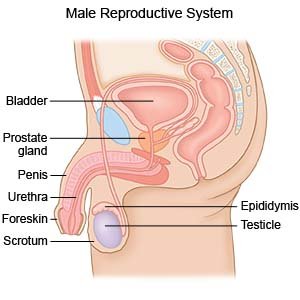Prostate Biopsy
Medically reviewed by Drugs.com. Last updated on Sep 23, 2025.
What do I need to know about a prostate biopsy?
A prostate biopsy is a procedure to remove samples of tissue from your prostate gland. The prostate is a male sex gland that makes fluid found in semen. It is located just below the bladder. After the samples are removed, they are sent to a lab and tested for cancer.
 |
How do I prepare for a prostate biopsy?
- Your healthcare provider will talk to you about how to prepare for this procedure. Your provider may tell you to shower the night before your surgery. He or she may tell you to use a certain soap to help prevent a surgical site infection. Your provider may tell you not to eat or drink anything after midnight on the day of your surgery.
- Tell your healthcare provider about all your current medicines. You will need to stop taking blood thinners several days before your procedure. Examples of blood thinners include warfarin and NSAIDs. You may also need to stop taking herbal supplements before your procedure. Your provider will tell you if you need to stop any other medicine for the procedure, and when to stop.
- You may be given an antibiotic to help prevent a bacterial infection. You may need to give yourself an enema (liquid medicine put in your rectum) to help empty your bowel before your procedure.
- Your provider will tell you if he or she plans to use MRI pictures during the biopsy. Metal can cause serious injury during an MRI. Tell your provider if you have any metal in or on your body.
Related medications
What will happen during a prostate biopsy?
- You may need to lie on your side with your knees pulled up toward your chest. Numbing cream or gel may be put into your rectum or injected near your prostate. You may instead be given general anesthesia to keep you asleep and free from pain during the procedure. A biopsy sample may be taken through your rectum, urethra, or perineum. The perineum is the area between your scrotum and rectum. Most of the time, biopsy samples are taken through the rectum.
- Your healthcare provider may insert a small ultrasound probe into your rectum. The ultrasound shows pictures of your prostate on a monitor, and is used to help guide the biopsy needle. Your provider may instead use MRI pictures to guide the placement. He or she will push the biopsy needle through the wall of your rectum and into your prostate gland.
- Your provider will remove 6 to 12 samples of tissue from several areas of your prostate gland. The samples will be sent to a lab and tested for cancer.
What should I expect after a prostate biopsy?
- You may feel soreness at the biopsy site.
- You may need to take antibiotics for up to 2 days after your procedure to help prevent an infection.
- You may have some bleeding from your rectum. You may also have blood in your urine, bowel movements, or semen.
What are the risks of a prostate biopsy?
You may bleed more than expected or get an infection in your urinary tract or prostate gland. The infection may spread to your blood and the rest of your body. Your bladder may not empty completely when you urinate. You may need a catheter to help empty your bladder for a short period of time. Cancer cells may be missed during your biopsy procedure. You may need another prostate biopsy to check for cancer again.
Care Agreement
You have the right to help plan your care. Learn about your health condition and how it may be treated. Discuss treatment options with your healthcare providers to decide what care you want to receive. You always have the right to refuse treatment. The above information is an educational aid only. It is not intended as medical advice for individual conditions or treatments. Talk to your doctor, nurse or pharmacist before following any medical regimen to see if it is safe and effective for you.© Copyright Merative 2025 Information is for End User's use only and may not be sold, redistributed or otherwise used for commercial purposes.
Further information
Always consult your healthcare provider to ensure the information displayed on this page applies to your personal circumstances.
